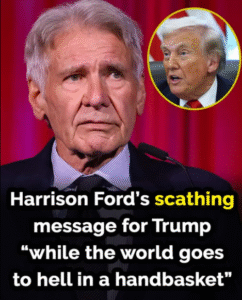The Context of Ford’s Comments
Ford’s critique came during an interview with a prominent media outlet, in which he was asked about the current state of American politics and the role public figures play in shaping political conversations. Known for his candid nature, Ford did not shy away from expressing strong opinions about Trump and his influence on the United States.
Ford began by expressing concern over what he perceives as the erosion of democratic norms. He described Trump’s leadership style as “polarizing” and “divisive,” emphasizing that the former president often encouraged societal fragmentation rather than unity. Ford said,
“The role of a leader is to bring people together, to inspire rather than inflame. When you see someone in that position deliberately stoking division, it’s hard to ignore the consequences.”
He further criticized Trump’s rhetoric as undermining trust in essential institutions. According to Ford, when political leaders routinely question the legitimacy of the press, courts, or election processes without evidence, it fosters a culture of skepticism and cynicism that can have lasting effects on the social fabric.
Key Points of Ford’s Critique
-
Divisive Leadership
Ford highlighted the ways in which Trump’s public statements often deepened societal divisions. He argued that leadership is not merely about policy but also about tone and example. “Words matter,” Ford said. “They set the stage for how we treat one another. When a leader consistently frames opponents as enemies or threats, it erodes the foundation of civil society.” -
Impact on Democracy
The actor expressed concern about the long-term impact on democratic institutions. He pointed to repeated attempts to delegitimize electoral outcomes as a significant threat. “Democracy depends on shared rules and trust,” Ford explained. “Without that trust, the system itself becomes fragile. And that’s what worries me the most.” -
Responsibility of Public Figures
Ford also reflected on the role of public figures, including celebrities, in shaping political narratives. While he acknowledged that some critics claim celebrities should “stick to their day jobs,” Ford argued that people with influence have a moral responsibility to speak out when they see behaviors that endanger democracy.
“Silence in the face of obvious threats is complicity,” he said. “If we have a platform, we have a duty to use it thoughtfully, even if it risks criticism.”
-
Cultural Implications
Beyond politics, Ford highlighted the broader cultural effects of Trump’s rhetoric. He noted that the normalization of aggressive, confrontational communication has permeated public discourse, contributing to heightened tension in communities, workplaces, and social spaces. “It’s not just policy or legislation,” Ford said. “It’s the tone we model for our children and for each other.”
Public and Media Reactions
Ford’s statements quickly went viral. Social media platforms were filled with a mix of reactions, ranging from strong support to vehement disagreement. Many applauded Ford for speaking openly, describing his comments as “honest,” “necessary,” and “refreshingly candid.”
Celebrity peers also weighed in. Some expressed admiration for his courage in addressing politically sensitive topics, noting that Ford’s reputation for thoughtfulness lends credibility to his critiques. Others, however, criticized him, arguing that actors and entertainers should remain neutral and that celebrity commentary often oversimplifies complex political issues.
News outlets analyzed his statements, noting the rarity of such blunt criticism from a figure of Ford’s stature. Many highlighted that he did not focus on partisan politics in a conventional sense but framed his critique around principles of leadership, civility, and the preservation of democratic norms.
Ford’s History of Advocacy
Harrison Ford has a long-standing history of engaging with public causes, particularly environmental issues. His advocacy for climate action and conservation demonstrates a consistent willingness to speak out on matters of public importance, even when controversial.
This background provides context for his comments on Trump. Ford has previously emphasized the importance of responsible leadership, whether in addressing climate change or in guiding national policy. Observers note that his critique of Trump is consistent with his broader worldview: a belief in stewardship, responsibility, and ethical governance.
Analysis: Why Ford’s Critique Resonates
Several factors contribute to the attention Ford’s critique has received:
-
Cultural Icon Status
As a figure celebrated for decades in film, Ford’s voice carries weight beyond the typical celebrity. His audience spans generations, giving his statements broad reach. -
Focus on Principles
Ford framed his critique around principles rather than partisan politics, emphasizing unity, democracy, and civil discourse. This approach resonates with people concerned about the tone of political leadership rather than specific party policies. -
Timing
With the country experiencing heightened political polarization, Ford’s critique tapped into ongoing concerns about the stability of democratic institutions and the health of civil discourse. -
Public Trust
Ford’s reputation for honesty and integrity enhances the impact of his comments. Unlike some celebrity critiques that are dismissed as opportunistic, Ford’s remarks are viewed as rooted in genuine concern for societal well-being.
Implications for Public Discourse
Ford’s statements contribute to a growing dialogue about the role of leaders and public figures in shaping political culture. His critique serves as a reminder that leadership is not limited to policy decisions; it also encompasses communication, moral guidance, and respect for institutional norms.
Moreover, the discussion underscores the evolving relationship between celebrity influence and politics. While some argue that celebrity commentary can oversimplify issues, others contend that it draws attention to concerns that might otherwise be ignored. Ford’s comments exemplify the potential for celebrities to influence public awareness while emphasizing ethical responsibility.
Moving Forward
While Ford’s critique is unlikely to alter political outcomes directly, it contributes to the broader discourse on leadership and democratic values. By framing his concerns in terms of principle rather than party, he invites a wider audience to reflect on the behaviors and norms that underpin effective governance.
Ford’s message is ultimately a call for accountability — not just for elected officials, but for all individuals who hold influence in society. His emphasis on civility, unity, and the preservation of democratic norms resonates in a moment when public discourse is increasingly fractious.
Conclusion
Harrison Ford’s recent critique of Donald Trump represents a convergence of celebrity influence, civic responsibility, and public concern for democracy. By speaking out, Ford has reminded the nation that leadership encompasses more than policy decisions; it requires integrity, empathy, and a commitment to uniting rather than dividing.
As Americans continue to navigate a politically polarized landscape, Ford’s comments serve as a timely reminder of the stakes involved in leadership and the importance of holding public figures accountable for the tone they set. Whether one agrees with his assessment or not, the critique underscores a fundamental truth: the health of democracy depends not only on institutions but also on the behavior and example of those in positions of power.
In the end, Ford’s critique is more than a commentary on Trump; it is a reflection on the values that sustain civil society, the responsibility of influence, and the role each citizen and public figure plays in shaping the future.


